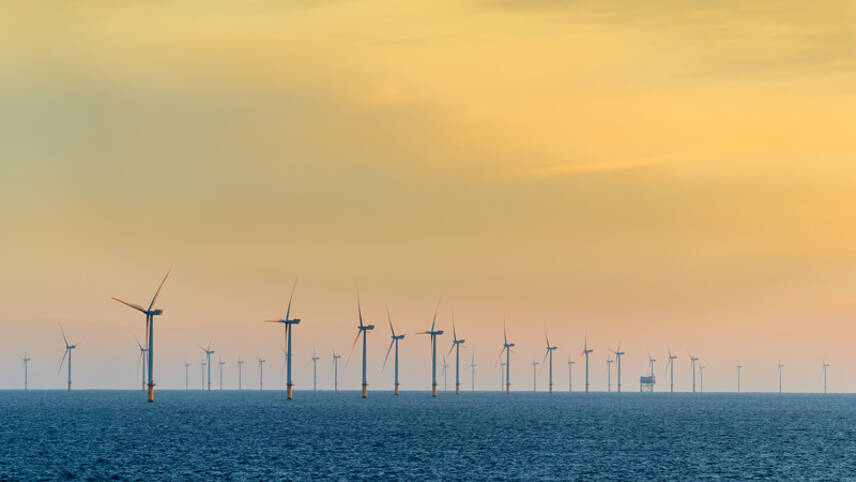Register for free and continue reading
Join our growing army of changemakers and get unlimited access to our premium content

Pictured: The Hornsea One wind farm. Image: Orsted
Published today (5 April), the report is the result of Pick’s engagement with key businesses and thought leaders across the UK’s offshore wind sector over the past year, plus his assessment of existing research. His key message is that, while the UK has historically been a leader on offshore wind, the global market is becoming increasingly competitive – and the UK cannot hang on to its leadership position indefinitely without more rapid and targeted policy interventions.
Pick states in his opening foreword that if Ministers “take just one message from the report, it should be the urgent need to upgrade our national grid for a world of high renewables penetration and widespread electrification”.
Grid connection times are cited as a particular cause for concern. Earlier this year, the Government confirmed that delivery timescales for Nationally Significant Infrastructure Projects (NSIPs) including offshore wind farms had increased by 65% between 2012 and 2021. It requested that the National Infrastructure Commission (NIC) completes a review of NSIP processes and, in the meantime, set work into motion for a new fast-track process for selected projects.
“Grid connections are increasingly becoming the rate-limiting factor for our offshore wind deployment going forward,” Pick’s new report warns. It emphasises that Chris Skidmore MP’s net-zero review recommendations focused heavily on the need for better grid infrastructure, but that Ministers did not take several recommendations in this field on board.
Measures that Ministers have snubbed – at least for now – include giving energy regulator Ofgem a net-zero remit. Pick is recommending that the Government helps to “re-balance Ofgem’s mandate away from its present focus on short-term consumer costs and towards a longer-term view of consumer impacts”.
Pick is also recommending that the Government considers reforming the connections queue process; ensures that planning agencies are sufficiently funded and staffed; and accelerates work to lift material constraints on the grid’s physical capacity.
Additionally floated in the report is the creation of an updated sector-specific strategy for offshore wind – a so-called ‘Industrial Growth Plan for Offshore Wind’. The current strategy was published before the UK set a target to host 40GW of offshore wind by 2030, which was then updated to 50GW. British shores currently host around 13.6GW of wind farms.
Such a plan could include deployment targets post-2030 and detail how supply chains and the skills base could be grow, to keep as much of the economic benefit of the sector’s growth within the UK as possible. The plan would also cover strategic plans for investing in offshore wind innovation, which Pick is arguing is just as important to do as it is for next-gen nuclear.
Green economy reaction
Trade body RenewableUK has stated that it “stands ready to work with Ministers to put the right framework in place” to support the delivery of Pick’s recommendations.
“Today’s independent report from the Offshore Wind Champion provides welcome recognition of the extraordinary success story that is the UK’s offshore wind sector, but it does not shy away from highlighting the harsh reality of the current political and regulatory backdrop which is potentially putting the UK’s leadership position in offshore wind at risk,” said Regen’s offshore sector lead Grace Millman.
“Regen welcomes the report’s recommendations, particularly its crystal-clear message to government on the urgent need to upgrade our national grid. It is also positive to see recognition that the current Contracts for Difference (CfD) mechanism could be built upon to recognise the value that goes beyond just price, such as supply chain development, energy system benefits and support in delivering a just transition.”
GMB general secretary Gary Smith said: “This damning report exposes the UK’s abject failure to pursue a proper industrial strategy to meet our energy needs. The nation’s electricity grid has been starved of investment and now the consequences are being felt.
“The Government’s wind energy targets are slipping out of view and the promise that tens of thousands of skilled jobs would be created here in the UK looks like a sick joke. We need urgent reform and investment in our energy infrastructure and manufacturing base – otherwise working people and their communities will once again pay the price.”


The insufficient capacity of the grid to connect new renewables to it, is not the only problem; the other is the lack of capacity to connect new electrical demands in particular electric vehicle charging points. Considering that by 2050, the UK’s annual PRIMARY energy demand of 1,600 TWh estimated by the Future Energy Scenarios (FES) of the National Grid will be mainly supplied as fossil-free electricity, with the balance from heat pumps, when at present electricity generation is only about 18% of our primary energy, ramping it up to be most of our primary energy is a massive task. Unfortunately building up the UK’s infrastructure is not a vote winner, but failure of our infrastructures is a vote loser and this is not the way to manage our future, especially with the existential threat of irreversible climate change just 27 years away.